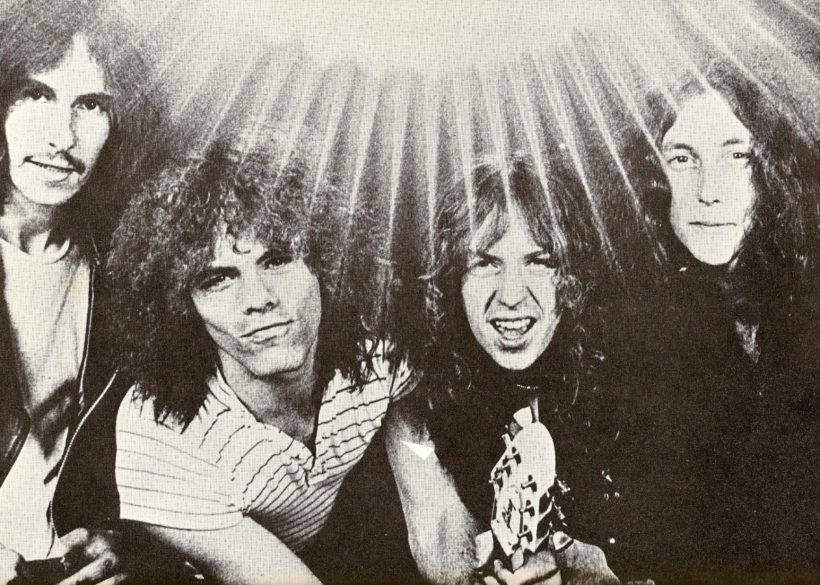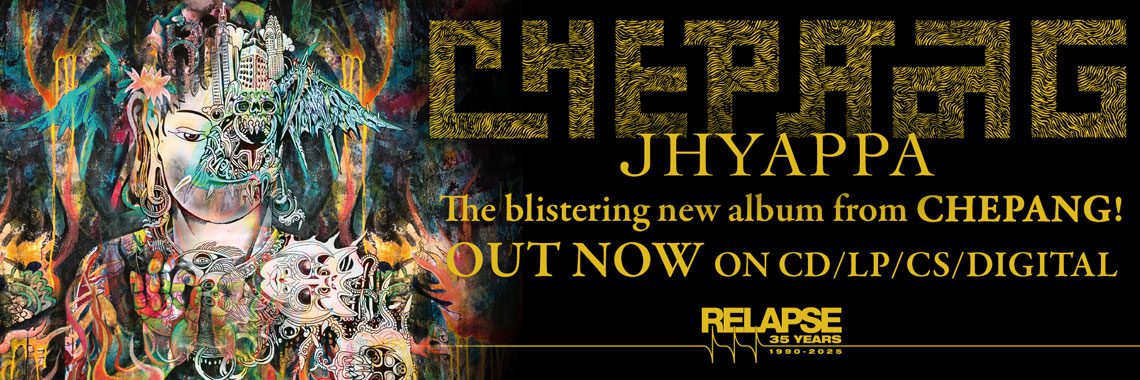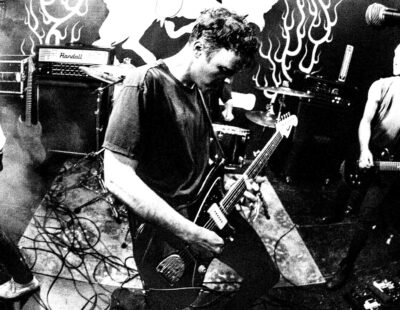
Diamond Head guitarist Brian Tatler will be the first to admit that his band’s genre-defining NWOBHM debut, Lightning to the Nations, self-released in 1980, has seen its fair share of reissues (and iterations) over the years. Until the death of the band’s manager, Reg Fellows, in 2005, Tatler and Co. had virtually no control over where and to whom it was licensed. The original mixdown tape was even “lost” for a period in the ’80s, and as a result the master tapes were even remixed for Metal Blade’s 1987 Behold the Beginning, with the results being less than satisfactory.
However, once Metallica drummer Lars Ulrich helped track down the original mixdown tape and returned it to the band in the late ’80s, it at least allowed the subsequent licensed versions to be taken from the original mix. Many of those reissues of Lightning to the Nations have also included the band’s early singles which were either self-released, or issued on other small indie labels of the day, so the album—and the material the band recorded prior to signing to MCA records in 1982—has remained available in one form or another. The current iteration of Diamond Head—Tatler, vocalist Rasmus Anderson, guitarist Andy Abberley, bassist Dean Ashton and drummer Karl Wilcox—even re-recorded Lightning in 2020.
So why should Diamond Head fans, old and new, care about the latest remastered version of Lightning to the Nations, released September 30 on Silver Lining Music (which you can order here)? We put that question and more to Tatler via a Zoom call, just before Diamond Head left for a European tour with fellow NWOBHM legends Saxon (dates below).

There have been a lot of versions of Lightning over the years. What’s different about this one?
There are five versions of songs that have never been released before. I discovered some tapes . . . There’s this guy called Pete Winkelman who had a studio and he had a flood in his cellar. He had all the master tapes for our Death and Progress (1993) and Evil Live (1994) albums. He said, “come and get the tapes, because I could have another flood—they’re OK, but they could get damaged—so I’d rather you have them and keep them safe.” I went and got them, and amongst all these two-inch reels [the masters of Death and Progress and Evil Live], there were a couple of quarter-inch reels with “Diamond Head” written on them. I’d never seen them before and didn’t know what they were. So while we were in lockdown [during the pandemic], I decided to find somebody [with a studio] who had a machine that could play them. It turned out that there were different versions of [five of] the songs that were on Lighting to the Nations. There were different mixes, a mono mix, and even a different guitar solo here and there, and a different vocal. I didn’t know these existed; I had no idea. It’s a miracle they’ve survived.
How was it listening to these lost versions of “Lightning to the Nations,” “The Prince,” “Sucking My Love,” “Am I Evil?” and “Sweet and Innocent” for the first time in decades?
Yeah, it was weird. I imagine the engineer might have run them off to listen or maybe give to our manager. And somehow they ended being stored away in Winkelman’s tape cellar. They found their way back to me. I don’t know who did them, why they were done. I’ve never had a copy. I’ve got things like cassettes and demos and things, but these are actual studio recordings, so they’re good quality. I just thought the fans would probably want to hear these, as I did. I was fascinated to know what was on the tapes.
You’ve included the tracks from the singles released during this era, which other reissues have also done. Is there anything else left in the vaults?
The only outstanding things would be—excluding the MCA years—things like the B-side of the “Shoot Out the Lights” single which had another version of “Helpless” we recorded for that. I suppose I could have put that on, but I didn’t in the end. And there’s a [remixed] version of “It’s Electric” from the Diamond Lights EP, which has a different ending. We could have put that out for the completists, but I think [this reissue] is fine as it is. [I have] demos of “Borrowed Time,” Diamond Lights” and “Don’t You Ever Leave Me,” but because they weren’t done during this time—they were done a bit later—and were more related to the Borrowed Time album, I didn’t think they were appropriate for this release.
So was everything on here remastered?
Ras, our singer, remastered the [bonus and lost] songs and we also remastered the original Lightning to the Nations from the original mix that had been digitized almost 30 years ago. [That digitized version] sounded better than the actual tape, so the quality is really good. It’s cleaner and sounds a bit more open, I think, than some of the [previous] versions of the album.
How did Ras end up mastering it?
He’s a producer and he’s got all the equipment for mastering. So he’s mastered albums before. He’s mixing an album right now before we start the European tour. He’s very good. He would send things to me [during the mastering process] to make sure I liked what he was doing. There isn’t a lot you’ve got to do with mastering. You just have to try and bring out anything that it needs, or if there’s anything harsh you can go in and control some of the frequencies and compression. It’s an art. I haven’t got the hearing to do that. My hearing’s not very good anymore—too many gigs. I couldn’t do the mastering job, so I put it onto somebody I trust. [Laughs] Ras is such an integral part of the band and I’ve witnessed his art, so I’m happy to let him do it for me. I’ve been to mastering suites in the past, and they sort of do it in a couple of hours and say, there you go. They don’t really care, they just want the next product. But [Ras] has been in Diamond Head for eight years and he knows the workings and what it should sound like. So he was perfect for the job.
How much does “improving” these original tapes sort of take away from the charm of the original version?
These haven’t been remixed or anything. These are just the actual recordings from back in the day. Behold the Beginning [issued by Metal Blade in 1987] was remixed. We went into the studio to remix it and I was there mostly just to oversee it. The engineer was adding samples to the snare drum and the kick drum and trying to make it a bit ’80s, a bit more modern. At the time in the control room, you think it sounds good, but in hindsight I didn’t really like it. It kind of messed with what was good in the first place. If it was good in the first place, you can’t really improve on it just by adding drum samples and maybe more reverb or something. So, yeah, it was no better. That version I’d prefer if it just sort of disappears into the ether.
Do you think this new remastering stays true to the original spirit?
It’s exactly the same mix [as the original pressing], just 42 years on. All that’s happened is that it’s probably had a little bit of EQ here and there. So nothing has really changed. A lot’s happened in 42 years, so it’s hard to be as excited about it as I was when I was 19. We recorded that album when we were 19. I think Colin was 20, but the rest of us were still 19. So there’s a lot of energy and enthusiasm and love gone into that record. It’s great that we captured it right there and then in that studio. That’s what survives on that original tape. It’s still exactly as it was. The only thing that’s changed is maybe people’s perception of Diamond Head over the years or from listening to so much well-produced records. To go back to an old record that was recorded cheaply and quickly, it can sound a little raw. But you either appreciate it for what it is or not.
Is this for the longtime fans, or the newer fans who might not be familiar with it?
I’d say a bit of both. The longtime fans will probably have this already, apart from those extra tracks, but they might want the new packaging and new art. And new fans may not even own it on CD or, they might want the new version on their phones or something. It’s fantastic that it’s still [in print] and people still want to buy it and still like the album after 42 years. It’s quite a thing for me to think that I made something that is still liked after all this time.
You seem to be the original member overseeing all of this. Do you consult with or keep the other members apprised of what you’re doing with this material?
[Laughs] To a degree. I’m still in touch with [bassist] Colin [Kimberley] and [drummer] Duncan [Scott]. And they’re fully aware of this and the deal was done with their knowledge and their inclusion. Outside of that, that’s where it is.
Diamond Head Europe and UK tour with Saxon
10/02/2022 Trianon – Paris, FR
10/03/2022 013 – Tilburg, NL
10/04/2022 Capitol – Hannover, DE
10/06/2022 Admiralspalast – Berlin, DE
10/07/2022 Muffathalle – Munich, DE
10/08/2022 Capitol -Offenbach, DE
10/10/2022 Alcatraz – Milan, IT
10/11/2022 Z7 – Pratteln, CH
10/12/2022 Trix – Antwerp, BE
10/13/2022 Patronaat – Haarlem, NL
10/15/2022 Train – Aarhus, DK
10/17/2022 Pustervik – Gothenburg, SE
10/18/2022 Rockefeller – Oslo, NO
10/19/2022 Amager Bio – Copenhagen, DK
10/21/2022 Hedon – Zwolle, NL
10/22/2022 La Bam – Metz, FR
10/23/2022 Les Docks – Lausanne, CH
11/11/2022 Regent Theatre – Ipswich, UK
11/12/2022 O2 Guildhall – Southampton, UK
11/13/2022 De La Warr Pavilion – Bexhill, UK
11/14/2022 St. David’s Hall – Cardiff, UK
11/15/2022 Forum – Bath, UK
11/16/2022 Corn Exchange – Cambridge, UK
11/18/2022 O2 City Hall – Newcastle, UK
11/19/2022 King George’s Hall – Blackburn, UK
11/20/2022 Music Hall – Aberdeen, UK
11/21/2022 Barrowland – Glasgow, UK
11/22/2022 City Hall – Hull, UK
11/23/2022 Barbican – York, UK
11/25/2022 De Montfort Hall – Leicester, UK
11/26/2022 Roundhouse – London, UK






